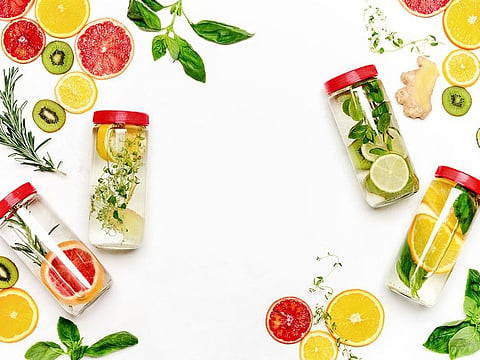Hydration: Have you been doing it wrong?
Experts tell us the common mistakes people make while drinking water during Ramadan

The way we observe the holy month may have changed as we take precautionary measures against Covid-19. But one basic thing hasn’t - the way we fast. And this Ramadan we are fasting for more than 14 hours a day. In order to make sure our bodies have enough fluids to prevent dehydration – which causes headache, fatigue and urinary tract infections – and reduce thirst, we need to get the facts about hydration right.
How body uses water
A main problem in ensuring adequate hydration during fasting is the misconceptions surrounding it, say experts across the UAE. "The common mistake is misunderstanding how the body uses water,” explains Dr Ahmed Moharram, Specialist – Urology, Bareen International Hospital at MBZ City, Abu Dhabi. “This leads to two main problems: drinking a lot of water either at iftar, thinking it will overcome dehydration or before sunrise at the start of the fast, thinking it will relieve thirst throughout the day.
“What is best for our bodies is to take in adequate amounts of water more or less evenly during non-fasting hours.”
So there is no point guzzling down glasses of water just before the beginning of the fast as the body will use what it needs at that moment and get rid of the excess as urine within two hours.
Stay away from thirst-inducing foods
“People generally underestimate the level of dehydration and its adverse effects on the body during fasting,” says Dr Sakina Yamani, Specialist Family Medicine at Mediclinic Welcare Hospital. “They tend to binge-drink cold water hoping it will quench their thirst, drink fizzy beverages, teas, coffees or juices excessively, or eat heavy and rich meals for iftar and suhour.
“In reality, these mistakes tend to increase the level of thirst during the day and don’t serve to rehydrate the body or replace the lost water during the fasting period.” Choose meals with high water content while avoiding fried and salty foods and sweets that trigger thirst, she adds. Limit tea and coffee intake as they make you lose more water from your body.
Understand your body's needs
Another wrong notion that people have is that they don’t need to hydrate as usual due to fewer working hours and lesser physical activity during Ramadan. Nafeesa Ahmed, Director of Nutrition and Lifestyle Management at Zulekha Hospital, insists a person’s baseline fluid requirements remain unchanged during fasting and advises everyone to drink at least 8-12 glasses of water every day. Don’t wait to feel thirsty, she says. Reach out for 1-2 glasses of water before and after every meal to ensure you meet your daily quota.
A good indicator whether your fluid intake is adequate is the colour of urine, explains Dr Moharram. “Dark urine means dehydration. Drink more water until the urine colour turns light.”
The temperature of the water doesn’t matter when it comes to hydration, although some studies claim lukewarm water aids in digestion. “The bottom line is to ensure you get enough water in you daily and drinking at your preferred temperature is the best way to reach that goal,” says Aleksandra Simic, Marketing Manager, Water and Beverages at National Food Products Company (NFPC), which owns the water brand Oasis. “Moreover, bottled water is free of impurities and also nutrient-rich, with added electrolytes such as potassium and sodium and vitamins like B, E, and D.
“Mineral water, in addition, carries calcium and magnesium, which can play important roles in regulating blood pressure and glucose levels, as well as aid in digestion.”
Fluids count
Hydration doesn’t refer just to water intake. It includes all fluids such as juices, milk and laban, which replenish water and salts, says Zulekha Hospital’s Nafeesa Ahmed. “Fruit juices are an excellent source that provides quick nutrients and vitamins after all-day fasting,” adds Aleksandra Simic, Marketing Manager, Water and Beverages at NFPC, which includes Lacnor juices and Laban Up among its brands. Ahmed agrees: “Of added benefit is the fact they are also a good source of simple sugar, which will give an immediate energy boost after ending the fast. But caution is advised against excess as it will result in excess intake of empty calories.”
Milk and laban are good sources of calcium while soups add to the water content. But don’t treat any of the fluids as a replacement for water.
Sign up for the Daily Briefing
Get the latest news and updates straight to your inbox



